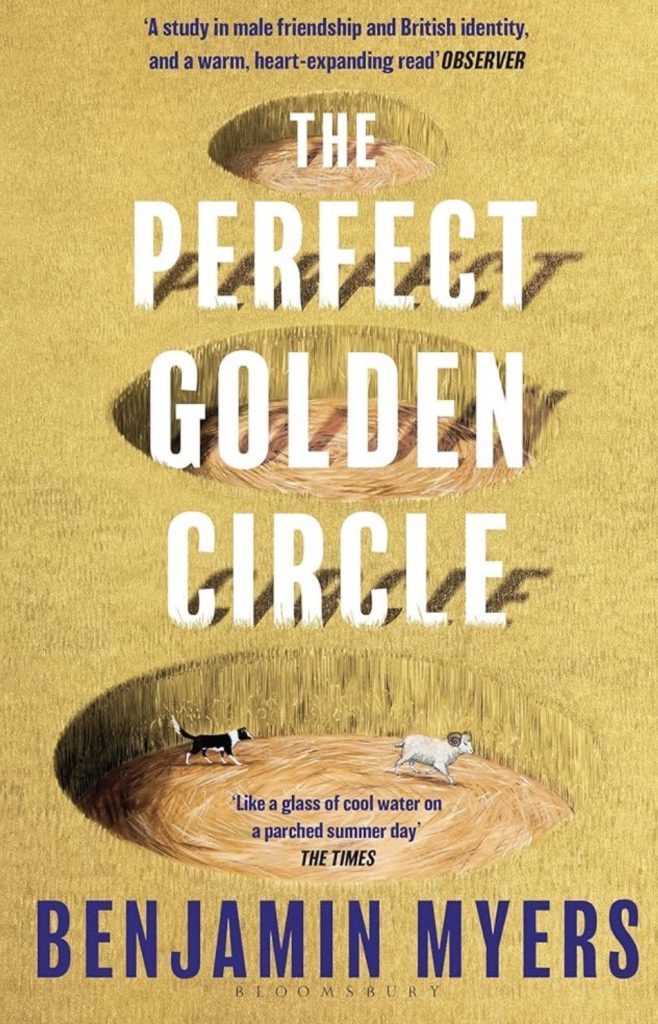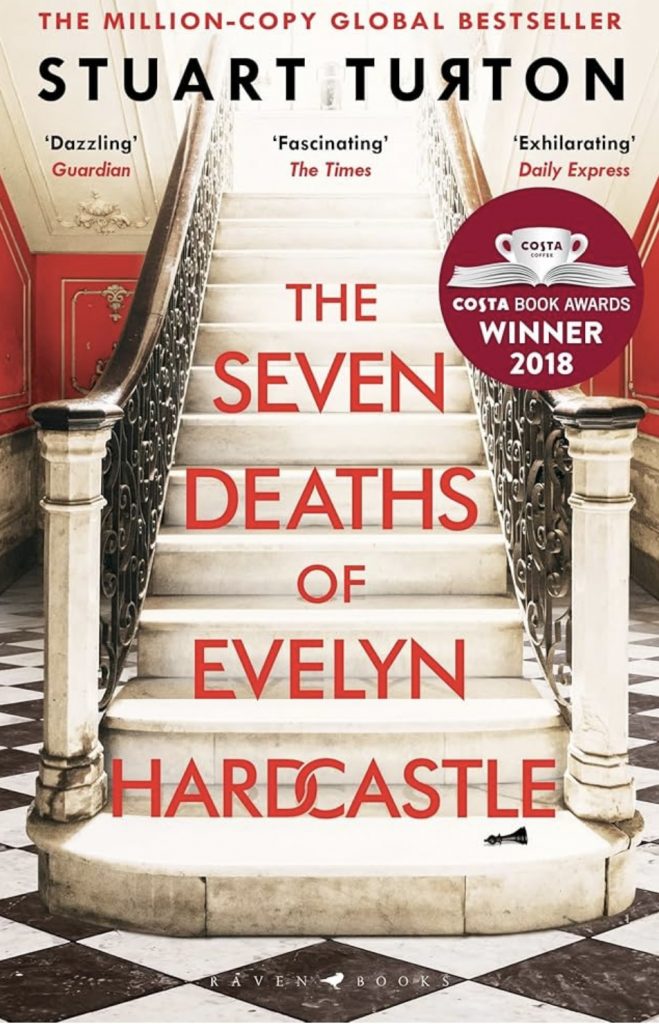
GROUP CONVENOR – Christine Wright
We meet on the first Wednesday of the month at 1.00 pm in the Assembly Room at St Austell Arts Centre. If you enjoy reading and discussing the book you have read, come along and join us.
NB This group is now at capacity. Please contact the Group Convenor via the below form if you would like to be added to a waiting list.
Below are details of our recently read books.
December 2025 – The Perfect Golden Circle – Benjamin Myers

The story takes place in the hot summer of 1989 and we are introduced to the two main characters, Calvert and Redbone. Calvert is a damaged former soldier, veteran of the Falklands war living a monk-like existence in a tiny cottage (the second smallest house in the country!) whilst Redbone is an ageing hippie living mainly in a van, but occasionally with one of several girlfriends. Their friendship develops through their unconventional, but very different, lifestyles on the outside of society and their love of wildlife, nature and the land. They work together creating crop circles in the dead of night. Redbone creates the design and Calvert makes it happen on the ground.
Their circles create speculation in the press about aliens and people actually pay some of the farmers to see them. The farmers do not object to the circles as no crops are damaged in the making of them.
Some comments from members of the Group:
“I loved this book mostly because it really caught the human need to be creative, albeit in a quite unusual and mysterious way. Myers’ beautiful way with words describing the English countryside and the way the two men felt this so deeply in their bones made for compelling reading. Their feelings of connection to the earth and the past lives lived there is beautifully conveyed and they become consumed by almost superhuman energy as if driven on by past “battle slain bodies of this wonder – England! The repartee and sparse, compact humour between the two friends sometimes reminded me of Shakespeare’s fools or clowns and jesters”
“It is a story of two very unlikely friends where what is not said is louder than what is said. The idea to centre the novel using the crop circles as the focus was brilliant and Myers’ descriptive prose was so good. “the night steals their thoughts for a few minutes. It drags each man off in a different direction, their feet trapped in the stirrups of a galloping beast called rumination” Each circle becomes more complicated, culminating in the Honeycomb Double Helix, their final achievement.”
“We learn more about their characters in each chapter. The author uses the story as a platform for his own beliefs. Within the framework of the story there are other stories like the fly-tipping, hare coursing, the old lady searching for her dog for 80 years and the meeting with the very posh, very drunk earl – I liked these “
“Redbone and Calvert have had very different paths in their lives but come together due to their mutual love for nature and their disgust with those who disrespect it. They create ever more complicated circles and are amused at the media attention about who was responsible for them and even experts thought they were the work of aliens which leads us to think how close to the truth of this novel”
“I liked the dynamic between these two very different characters. They are moralistic and respectful of Mother Nature and have a deep connection to the land. Their nightly quests do not always go smoothly and they have interruptions from flytippers, a lady with dementia and drunken aristocrats. I enjoyed the book. It was calm and uplifting with a sense of nostalgia. Cleverly written and quite poignant”
“Beautiful poetic prose re English countryside I was particularly interested in the two characters, both very different backgrounds and upbringings but seemingly very close trusting and admiring of each other, military service, trauma of war in the Falklands, dismissive view of government and commonplace life, almost fanatical approach to pursue secret quest for creating corn circles. These guys live in a separate sub culture, one in an old camper van the other in the second smallest house in England, it defies imagination. They have anarchic energy, crazy encounters with folks ie comic engagement with rich entitled landowners. I first heard about corncircles and associated cults when I met In Australia a couple who travelled to England one summer specially to view them. I have recently heard there is another author Andy Thomas who I am led to believe gives very plausible lectures on the paranormal and corn circles . A fascinating novel to read .
“I found this book quite difficult to describe. There are only two characters in the story, Calvert and Redbone. The story centres on Calvert a veteran of the Falklands conflict and a member of the SAS who is surely suffering from post traumatic stress disorder spending his time creating beauty in the countryside making corn circles with his friend Redbone trying to shut out the horrors of his past experiences.
I find it hard to understand why a man so dedicated to the beauty of the countryside and nature preservation would ever join the army. Whether the making of the corn circles clears him of his guilt is never made clear. I also find it hard to believe that two grown men can walk through a field of corn for a couple of hours and not damage the crop.
I enjoyed the first few chapters describing the nightly visits to the cornfields. The author’s descriptions were very poetic and took me back to my own childhood in the countryside and the beauty I had enjoyed especially the night skies. However, you could only have so much of a good thing, and I quickly got bored and was disappointed that there was no further major action in the story. I really wanted to pick the pair of them up give them a good shake and tell them to get a life!”
November 2025 – The Seven Deaths of Evelyn Hardcastle – Stuart Turton

This novel won the Best First Novel at the 2018 Costa Book Awards, was No 1 on Saturday Times 2018 best seller list and No 5 on the Sunday Times best seller list 2018.
This was a long, arduous read for some of the group – not everyone finished it but one member actually read it twice to better understand the plot and interplay! The rest of us thought she deserved a medal! This review is longer than usual because of the various interpretations by group members all of which deserved space.
Aiden Bishop relives the same day eight times, each time inhabiting bodies of different guests to solve the murder of Evelyn Hardcastle at a mysterious manor house called Blackheath. He finds himself trapped in a supernatural loop, forced to relive the same day repeatedly, each day occupying the body of a different guest at Blackheath, a decaying manor in the English countryside where a masked ball takes place each night. He has to try and solve the murder of Evelyn Hardcastle who is destined to die at 11pm that night. If he fails to uncover the murder within the eight iterations, he will be reset and lose all memories of his previous attempts.
Some comments from members:
“I was intrigued by the premise of this book with its original take on the classic murder mystery. As I read, however, I found myself becoming increasingly disinterested. The dazzling pyrotechnics of the storytelling started to feel repetitive and tiresome and, feeling no emotional connection to any of the characters, I have to confess that I gave up well before the (500+ pages) end.”
“Fortunately, I managed to get an audio copy of this book and so I was able to read it quite quickly. However, I didn’t realise there was a list of the characters at the front of the library book, and I got very confused with the characters. This is not my sort of book, and I didn’t take much interest but wanted to know the outcome. After I had finished, I found the list of characters in the book and decided to read the book again to see if I could make more sense of it. I quite enjoyed the first half of the book but then lost interest as more and more unpleasant scenes unravelled. But I did persevere to the end again.
This is a very dark story like a bad dream on a loop that you can’t get off. The plot is very complicated and even though I read it twice I couldn’t tell you what really happened to Thomas. I thought the idea of retelling the story in different characters was a clever idea but for me it went on too much. Too many evil characters for my liking too many murders and evil doings. It might be clever writing, but no thank you not for me!”
“This book is an imaginative and challenging portrayal of thriller genre. We are introduced to Blackheath, a country pile in decay and decline, a class structure that is gradually crumbling away, changing the outlook of society.
We are challenged with the protagonist morphing from one character to another every day with the purpose of finding out what happens to Evelyn Hardcastle. This has the suggestion of the ancient pagan belief of Shamanism whereby an animal or ancient witch could shapeshift to another being.
As the book progresses, we learn of the secrets of the different characters. In the end, we find out the purpose of the house – the occupants paying for crimes committed. Aiden and Evelyn are released from Blackheath as a result of finding the murderer.”
“Before starting this book, I read the author’s note where he explains his inspiration for the story was Agatha Christie whose book were introduced to him by a neighbour when he was 8 years old. I started reading Agatha Christie at about the same age – my father used to borrow them from the library, and, like a Christie novel, many clues were not recognisable until the end – like the map and invitation before the story and the ongoing appearance of the chess piece. I loved this book, it pulled me in from the start – the setting, the weather, the dilapidate hall, the masked ball, the characters and jumping though time and people – Groundhog Day meets Quantum leap!
Keeping up with the characters was quite a challenge but added to the interest, not being able to distinguish between the good and bad guys until the very end. The final twist was brilliant. I would read this book again.”
“I wanted to make sense of the story from the time Sebastian Bell wakes up in the forest. I thought perhaps he had been drugged and kidnapped. When we are told about the child who had died many years before I thought perhaps, he was implicated and the purpose of gathering the guests was to find out who was guilty. I realised it was going to be difficult when Sebastian woke up in the body of Roger Collins! There were limited ways this could be explained – a nightmare? When it became clear this was not likely to be the case, I lost much interest in the story as it seemed to be slipping into the world of the supernatural or fantasy. I found it rather nightmarish when he woke up in the body of Lord Ravenscroft and his horror of being too fat to manage the stairs or get in and out of the bath unaided.
He doesn’t become another person; he just looks like them and is treated as the “other person”. How many other people are not in their “original” body? He has lost his memory so doesn’t know who he really is – are the others the same? So many questions! If I woke up as someone else, would I co-operate and be that person? Seems unlikely. Is it rather like a computer game…………?”
“I thought the story was an interesting and slightly macabre concept.
I found the characters and setting to be old fashioned.
It was like an old fashioned ‘who did it’ or a Cluedo game.
Lots of different characters and ‘hosts’ and I sort of lost track to be honest and a little bit of my will to carry on with it!
It was quite a long read too which added to the angst of it but I did want to know how it would turn out and I thought the ending was good.
All in all, an OK book for me but too long winded and dragged on. Was complicated and hard to keep up with who was who.”
Previous Reviews can be seen HERE
We are happy for you to come to a Coffee Morning or one main Monthly Meeting and to attend one individual group (with the exception of groups that require pre-booking and ticket purchases) before deciding whether to join St Austell u3a.
Please always contact the Group Convenor to ensure the session is going ahead.

